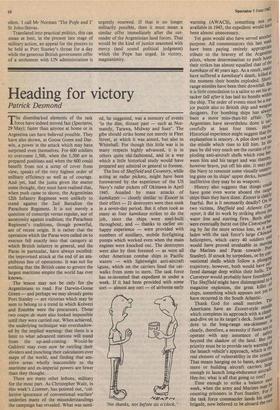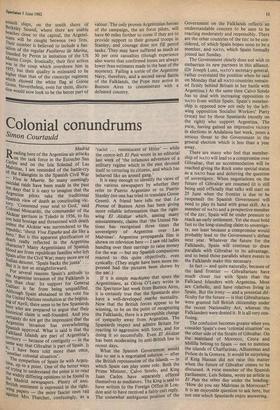Heading for victory
Patrick Desmond
The disembarked elements of the task force have indeed moved fast (Spectator, 29 May); faster than anyone at home or in Argentina can have believed possible. They have also shown, at Goose Green and Dar- win, a power in the attack which may have surprised even themselves. For 600 soldiers to overcome 1,500, when the 1,500 are in prepared positions and when the 600 could benefit from not a scrap of cover from view, speaks of the very highest order of military efficiency as well as of courage. And yet, had the junta given the matter some thought, they must have realised that, when push came to shove, the Argentinian 12th Infantry Regiment were unlikely to stand against the 2nd Battalion the Parachute Regiment. It is not merely a question of conscript versus regular, nor of anonymity against tradition; the Parachute Regiment's traditions, though powerful, are of recent origin. It is rather that the operation which the Paras were called on to execute fell exactly into that category at which British infantry in general, and the Paras in particular, have always excelled: the improvised attack at the end of an am- phibious line of operations. It was not for nothing that the British came to govern the largest maritime empire the world has ever known.
The lesson may not be only for the Argentinians to read. For Darwin-Goose Green — and perhaps we may already guess Port Stanley — are victories which may be seen to belong to a trend in which Kolwezi and Entebbe were the precursors. Those two coups de main also looked impossible until they were carried out. When achieved, the underlying technique was overshadow- ed by the implied warning: that there is a limit to what advanced nations will stand from the up-and-coming. Would-be Galtieris may even now be twirling their dividers and punching their calculators over maps of the world, and finding that sen- sitive areas wholly inaccessible to the maritime and ex-imperial powers are fewer than they thought.
There are many other lesions, military for the most part. As Christopher Wain, in this week's Listener, has pointed out, 'col- lective ignorance of conventional warfare' underlies many of the misunderstandings the campaign has revealed. What was need-
ed, he suggested, was a memory of events `in the dim, distant past — such as Nor- mandy, Tarawa, Midway and Suez'. The gibe should strike home not merely in Fleet Street, at which it was aimed, but also in Whitehall. For though this little war is in many respects highly advanced, it is in others quite old-fashioned, and in a way which a little historical study would have prepared any admiral or general to foresee.
The loss of Sheffield and Coventry, while acting as radar pickets, might have been forewarned by the experience of the US Navy's radar pickets off Okinawa in April 1945. Assailed by mass attacks of kamikazes — closely similar to Exocet in their effect — 21 destroyers were then sunk in a seven-day period. But it often took as many as four kamikaze strikes to do the job, since the ships were steel-built throughout, and — thanks to earlier un- happy experience — were provided with numbers of auxiliary, mobile firefighting pumps which worked even when the main engines were knocked out. The destroyers were also by then forested — as were all other American combat ships in Pacific waters — with lightweight anti-aircraft guns, which on the carriers lined the cat- walks from stem to stern. The task force has re-invented that expedient in under a week. If it had been provided with some sort — almost any sort — of airborne early 'No thanks, not before six o'clock.' Yet
available in 1945, the expedient would have been almost unnecessary. Yet guns would also have served another purpose. All commentators this last week have been paying entirely approPriare tribute to the bravery of the Argentine pilots, whose determination to push borne their strikes has almost equalled that of the kamikaze of 40 years ago. As a result, marl)/ have suffered a kamikaze's death, killed at the moment their bombs exploded. Short- range missiles have been their downfall. But it is little consolation to a sailor to see his at" tacker fall after it has laid its bombs within the ship. The order of events must be a ma" jor puzzle also to British ship and weapon designers. For bombing ships has always been a more miss-than-hit affair. The Argentines have nevertheless done it sue; cessfully at least four times. WI!' Historical experience might suggest that the explanation is sensory. A pilot does not see the missile which rises to kill him. In the past he did very much see the curtain of ex' ploding anti-aircraft shells which rose be ween him and his target and was thereby' however brave, put off his aim. It may Pa) the Navy to remount some visually unnerv- ing guns on its ships' upper decks, however ineffective they may be as weapons. History also suggests that things could have gone even worse aboard the target ships than they have done. Exocet is clearly fearful. But is it necessarily deadly? On Its two victims, Sheffield and Atlantic an- veyor, it did its work by striking above the water line and starting fires. Both shills were eventually burnt out (the Conveyorbe- ing by far the more serious loss, as it 1 laden with the task force's large ChM°°A helicopters, which carry 40 soldiers an would have proved invaluable in moving the Marines and Paras towards Mt Stanley). If struck by torpedoes, or by On ventional shells which follow a plunginf, trajectory, however, both would have sine fered damage deep within their hulls. Conveyor would probably have foundered The Sheffield might have disintegrated to af magazine explosion, the great killer 0 ships, something which appears not yet t have occurred in the South Atlantic. The Thank God for small mercies. Americans have an Exocet-style missile which completes its approach with a clitlit;- and-dive on to its target's deck. Some an dote to the long-range sea-skimmer is clearly, therefore, a necessity if fleets are to operate with any assurance of safetle beyond the shadow of the land. But t'.h 1. priority must be to provide early warning fe the launch vehicle's approach, which is the real element of vulnerability in the systerll'a That means hanging on to bases, acquirilLe more or building aircraft carriers tall, enough to launch long-endurance aircraft. Hey-ho; what is all that going to cost? t Time enough to strike a balance riebge week, when the army and Marines ma)' if counting prisoners in Port Stanley. F°r,:i the task force commander lands his °tile brigade, now believed to be aboard the rvJ°
assault ships, on the south shore of
beaches Sound, where there are usable Peaches close to the capital, the Argent- Mans will be caught between two fires. Their number is believed to include a bat- talion of the regular Fusilieros de Marina, founded by Peron in imitation of the US Marine Corps. Ironically, their first action Was in the coup which overthrew him in ,19,55, but their quality is estimated to be nigher than that of the conscript regiment Which showed the white flag at Goose Green. Nevertheless, even for them, discre- tion would now look to be the better part of
valour. The only proven Argentinian heroes of the campaign, the air force pilots, will have 60 miles further to come if they are to provide support to their ground troops in Stanley, and courage does not fill petrol tanks. They may have suffered as much as 30 per cent casualties (though experience also warns that confirmed losses are always lower than estimates made in the heat of the moment). Failing a sortie of the Argentine Navy, therefore, and a second naval Battle of the Falklands, the Pope may arrive in Buenos Aires to commiserate with a defeated country.







































 Previous page
Previous page